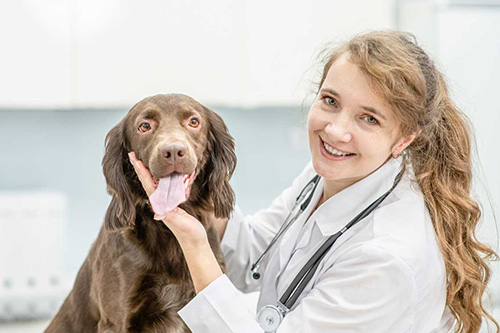How to Keep Your Aging Dog Comfortable

How to Keep Your Aging Dog Comfortable
It can be difficult to watch your beloved dog get older and lose some of their energy and physical ability. However, there are plenty of fun things to do with an old dog and ways you can keep them comfortable in their old age. Below we offer some of our top tips for senior dog enrichment.
Ensure Comfort
Get your older dog a nice cosy bed and blanket where they can lay. Many young dogs happily sprawl out on the floor to sleep, even hardwood floors. As your dog ages though, they are more likely to become stiff from snoozing on such surfaces. A thick, warm, orthopaedic dog bed provides a lot of joint support and comfort to an aching body.
Provide your dog with better protection from weather extremes as they get older. Discomfort with extreme weather may surface in your dog’s senior years, even if it was never a problem when younger. If your senior dog has limited mobility, ensure everything they need is close by, so they don’t need to climb stairs or travel a long distance to do things like eat food, drink water and go to the toilet.
Keep Your Dog Active
Providing your senior dog with regular exercise is important. The key is moderation. Too much and problems can worsen; too little won’t support muscle development. Regular walks and park visits help keep your dog’s muscles strong and supple, prevent obesity and stimulate appetite as needed.
Remember there are plenty of fun things to do with an old dog, albeit more slowly. Continuing to do the things your dog likes to do, such as go on a car ride or a walk around the park, keeps your dog happy as they get older and prevents anxiety and boredom.
Be Aware of Arthritis
Arthritis is one of the most common issues affecting senior dogs. Studies show that up to one in five dogs suffer from arthritis. It’s easy to assume that your aging pet is slowing down and becoming less active simply due to age. But it may be because of joint pain. The most obvious sign of arthritis is limping. However, other signs include:
- Stiffness
- Inactivity
- Depression
- Lethargy
- Swelling
- Difficulty rising
- Licking of joints
- Urinating indoors
- Muscle atrophy
- Tendency to sleep more
- Gain or loss of weight
- Tendency to sleep more
- Reluctance to jump
- Nervous or aggressive behaviour
- Vocalised pain if joint is touched or bumped
It’s important to be able to recognise the signs and symptoms of arthritis as it can be a source of chronic pain that negatively affects your dog’s quality of life.
Arthritis Treatment
The best way to avoid exacerbating arthritis problems is to ensure your dog is always at a healthy weight. This reduces the stress placed on joints. There are also special therapeutic pet foods available with Omega 3 and 6 fatty acids balanced in a specific ratio. This can help your pet by reducing inflammation and targeting pain pathways.
If therapeutic food doesn’t work well enough to alleviate your pet’s suffering, you can discuss options for pain medication with your vet.
Book a Consultation Today at Kirrawee Veterinary Hospital
If you have a dog with any health issues, or would like to discuss more ideas on senior dog enrichment, book an appointment at Kirrawee Veterinary Hospital. Call us today on 02 9521 6422 or contact us online to book an appointment.
Pet Care Tips Listing
- Things to Know About Pet Diabetes
- Things to Know About Dog and Cat Arthritis
- How to Prevent Your Dog from Biting: Child Safety Tips
- How to Keep Your Dog Mentally Active
- 5 Things to Ask at Your Pet’s First Vet Appointment
- How to Deal with Kidney Failure in Dogs
- What to Do If You See Wildlife on The Road
- 5 Things You Need Before Bringing a Kitten Home
- Fleas: Causes and Prevention for Dogs
- What to Look for in a New Vet?
- How to Stop Cats from Scratching Furniture
- Questions to Ask Your Vet About Your Senior Dog in NSW
- What is separation anxiety?
- 4 Mistakes to Avoid When Training Your Dog
- Choosing Teeth-Friendly Treats for Your Pets
- How to Prepare for Camping with Your Dog
- Maintaining Good Oral Hygiene in Your Pets
- How to Know if Your Dog Has Worms and What to Do
- How to Give Your Pet Medication
- 4 Signs Your Cat Should See a Vet
- Human Food Safety for Dogs: What Foods to Avoid
- Why You Need to Vaccinate Your Puppy Before You Walk It
- How to Potty Train Puppies
- Why Should You Vaccinate Your Cat?
- What Does It Mean If Your Puppy is Limping?
- Expert Dog Swimming Tips by Kirrawee Vet
- How Often Does Your Puppy Need a Bath?
- How to Keep Your Aging Dog Comfortable
- Common Preventable Diseases in Dogs
- Common Feline Musculoskeletal Disorders
- Why Should You Vaccinate Your Dog?
- Patellar Luxation in Dogs – Expert Care in NSW
- Musculoskeletal Disorders in Dogs
- Osteoarthritis in Dogs
- Causes and Treatment of Hip Dysplasia in Dogs
- Do Dogs Need Regular Dental Care?
- Breeds of Dogs That Need the Most Exercise?
- What to Feed Fluffy? Dry or Wet? Both?
